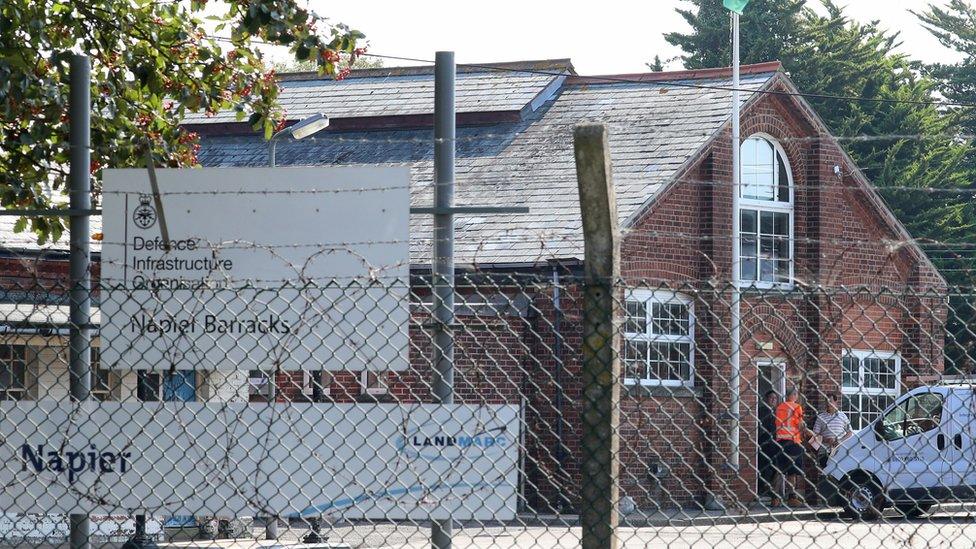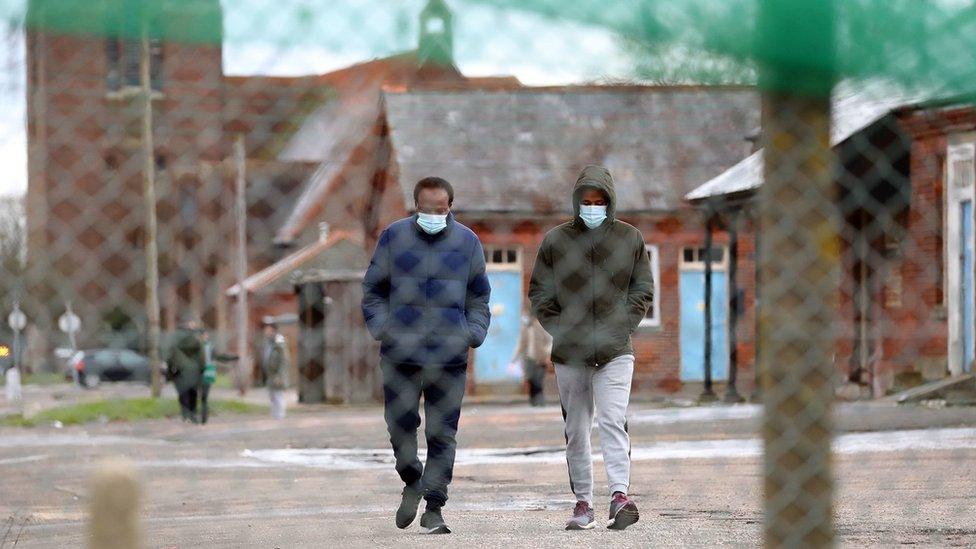Napier Barracks: Suicide attempts at 'unsafe' asylum-seeker camp
- Published

The former military site has been used by the Home Office since September 2020
A former military barracks used to house asylum seekers was "squalid, ill-equipped" and "unsafe", the High Court heard.
Six men who were housed at Napier Barracks in Folkestone, Kent, claim the accommodation breached their human rights.
Tom Hickman QC said an independent report found seven suicide attempts and seven incidents of serious self-harm.
The Home Office argues that the use of the barracks is lawful.
The six asylum seekers, who were all said to be victims of torture or human trafficking, claim there was a lack of healthcare, with no mental health support and only one nurse on site, the court heard.
Mr Hickman said that with high fences and a nightly curfew, it had "all the hallmarks of a detention facility" and was "not adequate accommodation for vulnerable persons".
He said it was "squalid, ill-equipped, lacking in personal privacy and unsafe".

Nearly 200 asylum seekers tested positive during a Covid-19 outbreak
Mr Hickman, representing four of the claimants, said that residents of the camp were "exposed to conditions that had serious detrimental impacts on their mental health" and were placed at an "exceptionally high risk" of contracting Covid-19.
Nearly 200 asylum seekers tested positive for the virus during an outbreak earlier this year.
Public health experts had repeatedly raised concerns about the use of the site during a pandemic, the court heard.
Mr Hickman said that after reviewing plans to contain any future outbreak, the director of infection control at NHS Kent and Medway had concluded: "It is not possible to provide a Covid-safe environment in barrack-style accommodation."
In a statement read to the court, one of the claimants, who has since been moved to other accommodation, said: "The situation in the camp is very bad and degrading."
"Detainees in the barracks including myself have lost hope."
He said he had seen one resident attempt to take his own life and learned of at least four others, adding: "This has been terrible for me to witness."
'Contingency accommodation'
About 45 people were moved to the barracks last week, Mr Hickman told the court, adding: "It appears to be the intention to gradually refill the camp."
Shu Shin Luh, representing two of the claimants, said the barracks had "re-triggered their past trauma".
Reading from the accounts of one of the claimants, she said: "The only difference between feeling like he is imprisoned [at Napier Barracks] and being detained and tortured in his country of origin is that he is not being physically tortured, but is being psychologically tortured."
Lisa Giovannetti QC, representing the Home Office, said in written submissions that the department had "taken reasonable steps to ensure that persons who are specifically vulnerable to severe illness or death from Covid-19" were not housed at the barracks.
She said the Home Office decided to use Napier Barracks "to provide short-term contingency accommodation to single, healthy adult males" in response to "an urgent need to source a significant number of additional accommodation spaces".
The hearing, before Mr Justice Linden, is due to conclude on Thursday.

Follow BBC South East on Facebook, external, on Twitter, external, and on Instagram, external. Send your story ideas to southeasttoday@bbc.co.uk, external.
Related topics
- Published16 February 2021
